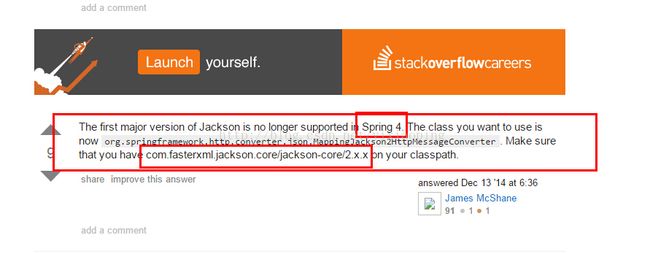SpringMVC @ResponseBody 415错误处理
闲话少说,刚开始用SpringMVC, 页面要使用jquery的ajax请求Controller。 但总是失败,主要表现为以下两个异常为:
异常一:java.lang.ClassNotFoundException: org.springframework.http.converter.json.MappingJacksonHttpMessageConverter
异常二:SpringMVC @ResponseBody 415错误处理
网上分析原因很多,但找了很久都没解决,基本是以下几类:
- springmvc添加配置、注解;
- pom.xml添加jackson包引用;
- Ajax请求时没有设置Content-Type为application/json
- 发送的请求内容不要转成JSON对象,直接发送JSON字符串即可
这些其实都没错!!!
以下是我分析的解决步骤方法:
(1)springMVC配置文件开启注解
(2)添加springMVC需要添加如下配置。 (这个要注意spring版本,3.x和4.x配置不同)
spring3.x是org.springframework.http.converter.json.MappingJacksonHttpMessageConverter
spring4.x是org.springframework.http.converter.json.MappingJackson2HttpMessageConverter
具体可以查看spring-web的jar确认,哪个存在用哪个!
spring3.x配置:
application/json;charset=UTF-8
spring4.x配置:
application/json;charset=UTF-8
(3)pom.xml添加jackson依赖(这个要注意spring版本,3.x和4.x配置不同)
如果是spring 3.x,pom.xml添加如下配置
org.codehaus.jackson
jackson-core-lgpl
1.8.1
org.codehaus.jackson
jackson-mapper-lgpl
1.8.1
com.fasterxml.jackson.core
jackson-core
2.5.2
com.fasterxml.jackson.core
jackson-databind
2.5.2
这里要说明一下,spring3.x用的是org.codehaus.jackson的1.x版本,在maven资源库,已经不在维护,统一迁移到com.fasterxml.jackson,版本对应为2.x
![]()
(4)ajax请求要求
- dataType 为 json
- contentType 为 'application/json;charse=UTF-8'
- data 转JSON字符串
我的代码:如下: (注意:这里只是针对POST +JSON字符串形式请求,后面我会详细讲解不同形式请求,的处理方法和案例)
var data = {
userAccount: lock_username,
userPasswd:hex_md5(lock_password).toUpperCase()
}
$.ajax({
url : ctx + "/unlock.do",
type : "POST",
data : JSON.stringify(data),
dataType: 'json',
contentType:'application/json;charset=UTF-8',
success : function(result) {
console.log(result);
}
});(5) Controller 接收响应JSON
以上配置OK,Controller中使用JSON方式有多种。这里简单介绍几种。
这个关键在于ajax请求是将数据以什么形式传递到后台,这里我总结了三种形式
- POST + JSON字符串形式
- POST + JSON对象形式
- GET + 参数字符串
- 方式一: POST + JSON字符串形式,如下:
//请求数据,登录账号 +密码
var data = {
userAccount: lock_username,
userPasswd:hex_md5(lock_password).toUpperCase()
}
$.ajax({
url : ctx + "/unlock.do",
type : "POST",
data : JSON.stringify(data), //转JSON字符串
dataType: 'json',
contentType:'application/json;charset=UTF-8', //contentType很重要
success : function(result) {
console.log(result);
}
});- 方式二: POST + JSON对象形式,如下:
//请求数据,登录账号 +密码
var data = {
userAccount: lock_username,
userPasswd:hex_md5(lock_password).toUpperCase()
}
$.ajax({
url : ctx + "/unlock.do",
type : "POST",
data : data, //直接用JSON对象
dataType: 'json',
success : function(result) {
console.log(result);
}
});代码案例:
5-1: 使用@RequestBody来设置输入 ,@ResponseBody设置输出 (POST + JSON字符串形式)
JS请求:
//请求数据,登录账号 +密码
var data = {
userAccount: lock_username,
userPasswd:hex_md5(lock_password).toUpperCase()
}
$.ajax({
url : ctx + "/unlock.do",
type : "POST",
data : JSON.stringify(data), //转JSON字符串
dataType: 'json',
contentType:'application/json;charset=UTF-8', //contentType很重要
success : function(result) {
console.log(result);
}
});
@RequestMapping(value = "/unlock", method = RequestMethod.POST,consumes = "application/json")
@ResponseBody
public Object unlock(@RequestBody User user) {
JSONObject jsonObject = new JSONObject();
try{
Assert.notNull(user.getUserAccount(), "解锁账号为空");
Assert.notNull(user.getUserPasswd(), "解锁密码为空");
User currentLoginUser = (User) MvcUtils.getSessionAttribute(Constants.LOGIN_USER);
Assert.notNull(currentLoginUser, "登录用户已过期,请重新登录!");
Assert.isTrue(StringUtils.equals(user.getUserAccount(),currentLoginUser.getUserAccount()), "解锁账号错误");
Assert.isTrue(StringUtils.equalsIgnoreCase(user.getUserPasswd(),currentLoginUser.getUserPasswd()), "解锁密码错误");
jsonObject.put("message", "解锁成功");
jsonObject.put("status", "success");
}catch(Exception ex){
jsonObject.put("message", ex.getMessage());
jsonObject.put("status", "error");
}
return jsonObject;
}
浏览器控制台输出:![]()
5-2: 使用HttpEntity来实现输入绑定,来ResponseEntit输出绑定(POST + JSON字符串形式)
JS请求:
//请求数据,登录账号 +密码
var data = {
userAccount: lock_username,
userPasswd:hex_md5(lock_password).toUpperCase()
}
$.ajax({
url : ctx + "/unlock.do",
type : "POST",
data : JSON.stringify(data), //转JSON字符串
dataType: 'json',
contentType:'application/json;charset=UTF-8', //contentType很重要
success : function(result) {
console.log(result);
}
});Controller处理:
@RequestMapping(value = "/unlock", method = RequestMethod.POST,consumes = "application/json")
public ResponseEntity5-3: 使用request.getParameter获取请求参数,响应JSON(POST + JSON对象形式) 和(GET + 参数字符串),Controller处理一样,区别在于是否加注解method ,
如果不加适用GET + POST ;
如果 method= RequestMethod.POST,用于POST 请求;
如果method=RequestMethod.GET,用于GET请求;
POST+ JSON对象形式请求:
var data = {
userAccount: lock_username,
userPasswd:hex_md5(lock_password).toUpperCase()
}
$.ajax({
url : ctx + "/unlock.do",
type : "POST",
data : data,
dataType: 'json',
success : function(result) {
console.log(result);
}
});GET + 参数字符串请求:
$.ajax({
url : ctx + "/unlock.do",
type : "GET",
dataType: "text",
data : "userAccount="+lock_username+"&userPasswd=" + hex_md5(lock_password).toUpperCase(),//等价于URL后面拼接参数
success : function(result) {
console.log(result);
}
});
@RequestMapping(value = "/unlock")
public void unlock(HttpServletRequest request,HttpServletResponse response) throws IOException {
JSONObject jsonObject = new JSONObject();
String userAccount = (String)request.getParameter("userAccount");
String userPasswd = (String)request.getParameter("userPasswd");
try{
Assert.notNull(userAccount, "解锁账号为空");
Assert.notNull(userPasswd, "解锁密码为空");
User currentLoginUser = (User) MvcUtils.getSessionAttribute(Constants.LOGIN_USER);
Assert.notNull(currentLoginUser, "登录用户已过期,请重新登录!");
Assert.isTrue(StringUtils.equals(userAccount,currentLoginUser.getUserAccount()), "解锁账号错误");
Assert.isTrue(StringUtils.equalsIgnoreCase(userPasswd,currentLoginUser.getUserPasswd()), "解锁密码错误");
jsonObject.put("message", "解锁成功");
jsonObject.put("status", "success");
}catch(Exception ex){
jsonObject.put("message", ex.getMessage());
jsonObject.put("status", "error");
}
response.getWriter().print(jsonObject.toString());
} 5-4: 使用@ModelAttribute将参数封装对象,响应JSON(POST + JSON对象形式) 和(GET + 参数字符串),Controller处理一样,区别在于是否加注解method 。
如果不加适用GET + POST ;
如果 method= RequestMethod.POST,用于POST 请求;
如果method=RequestMethod.GET,用于GET请求;
POST+ JSON对象形式请求:
var data = {
userAccount: lock_username,
userPasswd:hex_md5(lock_password).toUpperCase()
}
$.ajax({
url : ctx + "/unlock.do",
type : "POST",
data : data,
dataType: 'json',
success : function(result) {
console.log(result);
}
});GET + 参数字符串请求:
$.ajax({
url : ctx + "/unlock.do",
type : "GET",
dataType: "text",
data : "userAccount="+lock_username+"&userPasswd=" + hex_md5(lock_password).toUpperCase(),//等价于URL后面拼接参数
success : function(result) {
console.log(result);
}
});Controller处理:(这个案例只支持POST)
@RequestMapping(value = "/unlock",method = RequestMethod.POST)
public void unlock(@ModelAttribute("user") User user,PrintWriter printWriter) throws IOException {
JSONObject jsonObject = new JSONObject();
try{
Assert.notNull(user.getUserAccount(), "解锁账号为空");
Assert.notNull(user.getUserPasswd(), "解锁密码为空");
User currentLoginUser = (User) MvcUtils.getSessionAttribute(Constants.LOGIN_USER);
Assert.notNull(currentLoginUser, "登录用户已过期,请重新登录!");
Assert.isTrue(StringUtils.equals(user.getUserAccount(),currentLoginUser.getUserAccount()), "解锁账号错误");
Assert.isTrue(StringUtils.equalsIgnoreCase(user.getUserPasswd(),currentLoginUser.getUserPasswd()), "解锁密码错误");
jsonObject.put("message", "解锁成功");
jsonObject.put("status", "success");
}catch(Exception ex){
jsonObject.put("message", ex.getMessage());
jsonObject.put("status", "error");
}
printWriter.print(jsonObject.toString());
}
寻找问题学习过程中参考资料:
- Spring MVC 学习笔记 json格式的输入和输出
- 帮我找到解决异常问题的国外论坛贴
其他可以学习参考的博客:
- SpringMVC+ajax返回JSON串
- springMVC框架下JQuery传递并解析Json数据
- springmvc处理 Ajax
